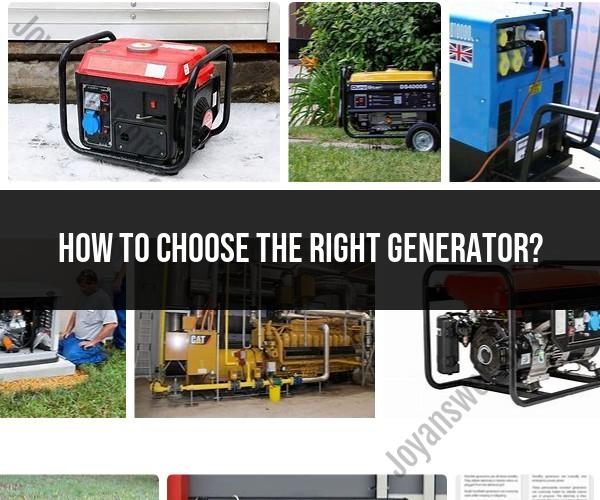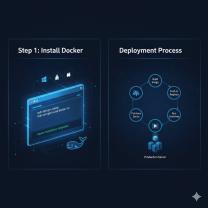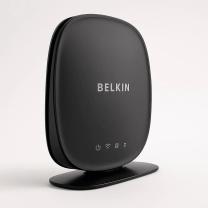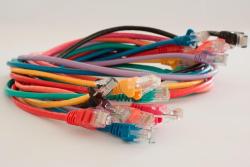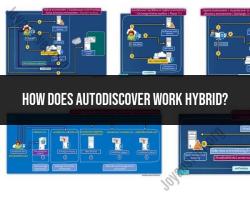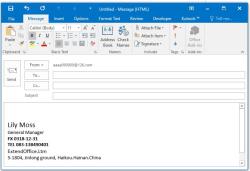How to choose the right generator?
Choosing the right generator depends on your specific needs and requirements. Generators come in various types and sizes, each designed for different purposes. Here are some key criteria and considerations to help you choose the right generator:
Power Output:
- Determine the power requirements of the equipment or appliances you need to run. Generators are rated by their power output in watts (W) or kilowatts (kW). Choose a generator that can handle the total power load, including both the continuous and peak loads.
Fuel Type:
- Generators can run on various fuels, including gasoline, diesel, natural gas, propane (LPG), and even solar power. Choose a fuel type that is readily available and suits your needs. Keep in mind that diesel generators are known for their fuel efficiency and durability, while gasoline generators are more portable and commonly used for smaller applications.
Portability:
- Consider whether you need a portable generator or a stationary one. Portable generators are compact and easy to move, making them suitable for outdoor activities or as backup power sources. Stationary generators are typically larger and installed permanently to provide backup power for homes or businesses.
Runtime and Fuel Efficiency:
- Generators have different runtimes based on their fuel tanks' capacity and fuel consumption rate. Calculate how long you need the generator to run continuously and choose a model that can meet your runtime requirements without frequent refueling.
Voltage and Phases:
- Ensure that the generator provides the required voltage (single-phase or three-phase) and matches the voltage requirements of your equipment.
Noise Level:
- Generators can be noisy, so consider the noise level (usually measured in decibels, dB) if you need a quiet operation, especially for residential or recreational use. Inverter generators are known for their quieter operation.
Start Mechanism:
- Generators can have different starting mechanisms, such as manual recoil, electric start, or remote start. Choose a starting mechanism that suits your convenience and ease of use.
Safety Features:
- Look for safety features like overload protection, low-oil shutdown, and automatic voltage regulation to protect your generator and connected equipment.
Emissions and Environmental Impact:
- If environmental concerns are important to you, consider generators that meet emission standards and are more environmentally friendly.
Brand and Reliability:
- Research and choose a reputable brand known for producing reliable generators. Read reviews and seek recommendations from others who have experience with the brand and model you're considering.
Maintenance and Support:
- Consider the ease of maintenance and the availability of service and support for the generator you choose.
Budget:
- Set a budget for your generator purchase and look for models that fit within your price range. Keep in mind that more powerful and feature-rich generators tend to be more expensive.
Regulations and Permits:
- Check local regulations and permit requirements for generator installation, especially if you plan to use it as a backup power source for your home or business.
Warranty:
- Ensure the generator comes with a warranty that provides adequate coverage for your needs. Read and understand the warranty terms and conditions.
Future Expansion:
- Consider whether you may need to expand your power capacity in the future. Choosing a generator that can accommodate future growth can be cost-effective in the long run.
Ultimately, the right generator for you depends on your specific circumstances and intended use. Carefully assess your power needs, budget, and any special requirements to make an informed decision. If you have specific questions or unique requirements, consider consulting with a generator expert or a professional electrician to ensure you choose the best generator for your needs.
Empowering Your Home: How to Choose the Right Generator
A generator can be a lifesaver during a power outage, providing backup power for your home's essential appliances and electronics. But with so many different types and sizes of generators available, it can be difficult to know which one is right for you.
Here are a few things to consider when choosing a generator:
- Wattage: The first step is to determine how much wattage you need. This will depend on the appliances and electronics that you want to power during an outage. To calculate your wattage needs, add up the wattage ratings of all the appliances and electronics you want to power.
- Fuel type: Generators come in a variety of fuel types, including gasoline, diesel, propane, and natural gas. Choose a fuel type that is convenient and affordable for you.
- Portability: If you need to be able to move your generator around, choose a portable model. Portable generators are typically smaller and lighter than stationary generators.
- Noise level: Generators can be noisy, so it is important to choose a model with a noise level that is acceptable to you.
- Features: Some generators come with additional features, such as automatic start/stop, remote start, and multiple outlets. Consider which features are important to you when making your decision.
Generator Selection Guide: Matching Your Needs to the Perfect Power Source
Once you have considered your wattage needs, fuel type, portability, noise level, and desired features, you can start narrowing down your choices. Here are a few tips for matching your needs to the perfect power source:
- If you only need to power a few essential appliances, such as the refrigerator, freezer, and lights, a small portable generator should be sufficient.
- If you need to power more appliances and electronics, or if you need to run your air conditioner, you will need a larger generator.
- If you live in an area with frequent power outages, you may want to consider a generator with automatic start/stop. This will ensure that your generator starts up automatically when the power goes out, so you don't have to worry about starting it yourself.
- If you need to be able to move your generator around, choose a portable model. However, keep in mind that portable generators are typically smaller and less powerful than stationary generators.
- If you are concerned about noise, choose a generator with a low noise level.
Reliable Backup Power: Tips for Selecting the Best Generator
Here are a few additional tips for selecting the best generator for your needs:
- Read reviews: Before you buy a generator, read reviews from other customers. This will help you to learn about the pros and cons of different models.
- Consider your budget: Generators can range in price from a few hundred dollars to several thousand dollars. Set a budget before you start shopping so that you don't overspend.
- Buy from a reputable dealer: Purchase your generator from a reputable dealer who offers a warranty.
Choosing the right generator can be a daunting task, but it is important to do your research and choose a model that will meet your needs. By following the tips above, you can find a generator that will provide reliable backup power for your home during an outage.
